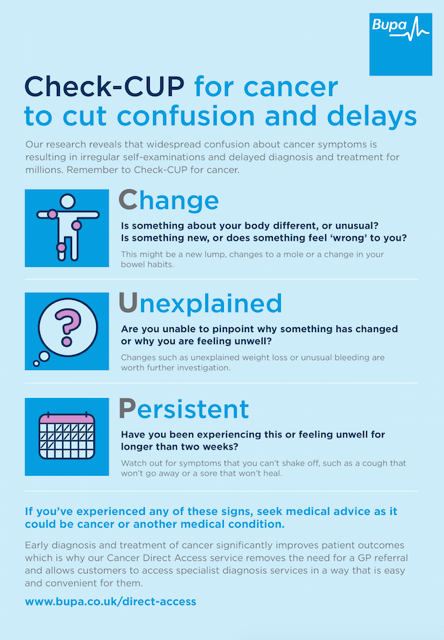Nearly six million delay seeking medical help, as half of all Brits are unclear what signs and symptoms to check for
According to new research released by Bupa, only three in five of us have checked for common symptoms of cancer. With nearly half of Britain unsure of what we should be checking for, an estimated six million may delay seeking medical help.
These latest figures, based on a survey of over 2,000 UK adults in July 2018, asked respondents how often they consciously check themselves for signs of the seven most prevalent cancers (bladder, bowel, breast, lung, pancreatic, skin and testicular).
On average, 38% of respondents admitted they had never checked themselves for any signs of cancer. A further 12% reported delaying a visit to the doctor concerning a potential cancer symptom because they didn’t realise what to look for, with 4% reporting that the symptom their delayed visit was concerning turned out to be cancerous.
Over 40% of respondents reported confusion about signs of common cancers to check for, with 45% finding it hard to remember the physical changes they should look for. Only 38% reported checking for symptoms at least once a month.
These figures have raised concern over the significant delay in diagnosis they can cause. The findings also highlight the varying awareness discrepancies between different types of cancer. While almost half of women check for breast cancer at least once a month, only a third of men regularly check for testicular cancer.
Overall, symptoms of other prevalent types of cancer, including bladder and pancreatic, were found to be far less well known and understood. Almost 70% reported not knowing any symptoms of pancreatic cancer, while nearly half of respondents (47%) couldn’t name any symptoms of bladder cancer.
Knowing which signs to look out for is vital in receiving an earlier diagnosis and improving survival rates. To help raise awareness of which symptoms we should be looking for, Bupa has created a simple cancer checkup guide, CUP.

Change - is something different or unusual? Is something new, or does something feel wrong to you? Trust yourself to know what is right and wrong; seek help.
Unexplained - can you pinpoint why something has changed, or why you are feeling physically unwell? If not, it is worth further investigation.
Persistent - have you been experiencing this or feeling unwell for longer than two weeks? Watch out for symptoms that you can’t shake off.
Those experiencing all three signs should seek medical advice. Dr. Luke James, Medical Director at Bupa UK Insurance commented:
“Half the population is expected to be diagnosed with cancer in their lifetime making early diagnosis and treatment so important to improving someone’s outcome. Survival rates continue to improve however many of us aren’t looking for the symptoms of certain cancers, or can’t identify them which is leading to delays in diagnosis.
“Our Cancer Check-CUP guide should help people check for possible signs of cancer and give them the confidence to seek advice if they need it. If someone is worried about an unexplained or lingering symptom I’d encourage them to always get medical advice.”
This new study comes just weeks after American researchers reported only 3% of us are aware of the links between low levels of exercise and an increased risk of cancer.
According to Macmillan, one of the UK’s leading cancer support charities, an estimated 2.5 million people are living with cancer across the UK, with numbers expected to rise to 4 million by 2030. Almost 1,000 people are diagnosed with cancer across the UK each day. One in two people born after 1960 in the UK are expected to be diagnosed with some form of cancer during their lifetime.


Comments